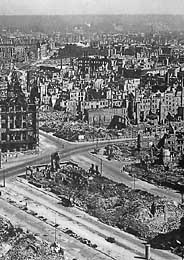sink-or-swim;
Grand Canyon experience
unstuck in time;
set up in business (optometry)
elected president (p. 49; 50)
"How do I get to be so old?"
dozing, forgetful;
smiling in his car, Lion's Club speech about Vietnam,
kidnapped;
|
The author's doubles |
World War II |
Billy Pilgrim after the war |
|
|
Timeline: (important references to dates: pp. 23, 58
| 1922 (birth in Ilium) sink-or-swim; Grand Canyon experience |
1944 (arrested)/ unstuck in time; set up in business (optometry) |
1945 discharged |
1957 Lion's Club elected president (p. 49; 50) |
|
| 1965 BP's
mother: "How do I get to be so old?" |
1966 in Zoo; dozing, forgetful; |
1967 smiling in his car, Lion's Club speech about Vietnam, kidnapped; |
1968 plane crash |
1976 2/13 B's death |
The author and the war:
|
B) Billy -- after the battle of the Bulge 32-33irrationality Children's Crusade; "all the real soldiers are dead" 159
Edgar Derby, old school teacher;
cruelty/inhumanity Roland Weary -- and Iron Maiden 35; his equipment 39-40; his narrow vision 41-42; revengeful 79
--Lazzaro's revenge 84; 139
-- Weary's torturecivilian soldier and humanity
* just babies p. 14
* the trip to Dresden--the carts that carry the POW 67-69; 70; becoming babies 75
* delousing 83 and bathing--in the prison and as a baby 84-85--bombing, POW's experience <--> spooning the syrup 160-161 "I suppose they all want dignity"
--the German farmers as soldiers 52humanity and Nature--"I suppose they all want dignity"; spooning the syrup 160-161
bird's "Poo-tee-wee"
C). heroism, myth vs. reality
--the Three Musketeers-- the commander and his golden boots,53 (--Cinderella myth)D) the images of the Americans, the Englishmen and Germans--Wild Bob's heroism
--the trip to Dresden
Howard Campbell 162; boundary 144 familiar since childhood
E) un-representable--reality unbearable
no characters 164
"It was like a dream" 121
![]() "So it goes."
(//airplane
crash, and the wife's car accident 25)? lice,
champaign84; 73;
"So it goes."
(//airplane
crash, and the wife's car accident 25)? lice,
champaign84; 73;
--candle and soap made from dead Jews 96; water 101; Billy's own death 143
(Kilgore¡XThe Gospel from Outer Space) 108-109¡Xdon't kill people with good connections
five sexes on T, seven on earth 114
prediction about the future 141; U.S. balkanized, Chicago--hydrogen-bombed
142
all moments exist simultaneously, hence nothing can be done to change the past or the future
death--in a bad condition at that moment
the moment simply is 77; no why
human beings as millepedes 87; their view of our concept of time 115
"We spend eternity looking at the peaceful moment" 117
"Everything was Beautiful and Nothing Hurts" 122
Montana Wildhack 132
interest in Darwin 210
| Slaughterhouse V | Rumford | Tralfamadore | Kilgore |
no hero, anti-glacier, nothing intelligent ¡VDresden deaths 135,000 |
183-
191 |
¡@ | ¡@ |
his response to T: 211-12 Rosewater's sympathy 102-3; 102-mother makes him feel guilty for not liking life |
25; 26-27--time
"all time is all time." "It simply is" --concept of time and their novels 88 "everything is beautiful and nothing hurts" "bugs in amber" 86 five sexes on T, seven on earth 114; end of Univ., ignore the awful times 117 BP's use of it 135 |
from Ilium 111
Fourth Dimension 104 The Gospel from Outer Space 108-109; Money Tree 167 Gutless wonder 168-(halitosis, drop gasoline bombs) happy and loud 170 view about fiction 171 about time machine 202 Big Board¡Xabout kidnap 201 |
|
| 3. Nature -- Billy cries for the horse 197,
the bird's "Poo-tee-weet?"; spooning syrup, 161 ongoing lives (births) in need of dignity. |
¡@ | ¡@ | ¡@ |
¡@
¡@
![]() War
and Literature: Some
Examples of Related Issues; Reasons
and Consequences in the U.S. involvement in the Vietnam civil war
War
and Literature: Some
Examples of Related Issues; Reasons
and Consequences in the U.S. involvement in the Vietnam civil war
![]() Dresden
& The Bombing of Dresden:
Dresden
& The Bombing of Dresden:

View from the tower of the City Hall 1945 (source) |
|
Slaughterhouse-V
Destruction of Dresden, destruction of Vonnegut's dream Brittany Dunstan - A reasearch paper on the affects of WWII on KV's writing, especially Slaughterhouse-Five.
The themes of Slaughterhouse-Five Marek Vit
Synchronicity between parallel plot lines in Slaughterhouse-Five' Cortney Joseph Fusco
- Kurt Vonnegut's universal acclaim and appeal surely comes in no small part from his gift for connecting, almost unnoticiably, seemingly unrelated objects and events to give them deeper meaning, creating a phenomenon known within Jungian circles as synchronicity.
So It Goes Leslie Phillips
- An overview of various things such as themes, symbols, metaphors, etc. in Vonnegut's Slaughterhouse-Five. It stresses the idea of predestination throughout the text.
The Use of Fragmentation in Slaughterhouse-Five Jason Dawley
- An essay analyzing the structure of Slaughterhouse-Five.
More Essays on Kurt Vonnegut Essay Collection